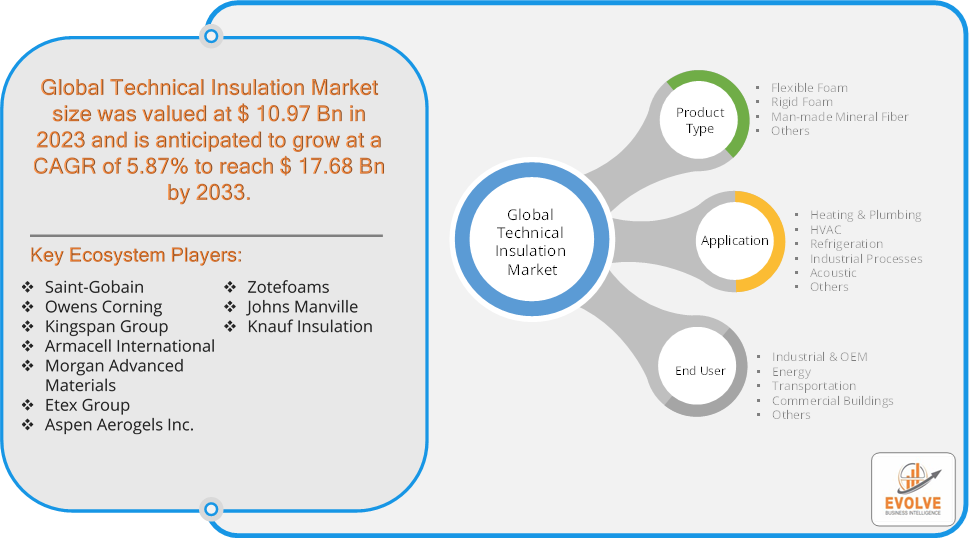Technical Insulation Market Estimated to Record 5.87% CAGR During Forecast Period

Evolve Business Intelligence has published a research report on the Global Technical Insulation Market, 2023–2033. The global Technical Insulation Market is projected to exhibit a CAGR of around 5.87% during the forecast period of 2023 to 2033.
Evolve Business Intelligence has recognized the following companies as the key players in the global Technical Insulation Market: Saint-Gobain, Owens Corning, Kingspan Group, Armacell International, Morgan Advanced Materials, Etex Group, Aspen Aerogels Inc., Zotefoams, Johns Manville and Knauf Insulation.
 More Information: https://evolvebi.com/report/technical-insulation-market-analysis/
More Information: https://evolvebi.com/report/technical-insulation-market-analysis/
Market Highlights
The Global Technical Insulation Market is projected to be valued at USD 17.68 Billion by 2033, recording a CAGR of around 5.87% during the forecast period. The Technical Insulation Market encompasses products designed to provide thermal and acoustic insulation in various industrial, commercial, and residential applications. Technical insulation includes materials used to control heat loss or gain, reduce noise, and enhance energy efficiency.
The market dynamics include factors such as technological advancements, increasing energy efficiency regulations, and growing awareness of sustainable building practices. The technical insulation market plays a crucial role in optimizing energy efficiency, enhancing safety, and improving the overall performance of industrial and commercial operations.
The COVID-19 pandemic had a significant impact on the Technical Insulation Market. The pandemic led to interruptions in the supply chain, including delays in the manufacturing and transportation of insulation materials. This disruption affected the availability of raw materials and finished products. The slowdown in construction and industrial activities during lockdowns reduced the demand for technical insulation in sectors such as residential and commercial construction, as well as industrial facilities. The focus on healthcare and essential infrastructure during the pandemic shifted some market priorities. However, the demand for insulation in healthcare facilities increased due to the need for maintaining temperature-sensitive environments. The pandemic heightened awareness of energy efficiency and sustainability. As economies began to recover, there was an increased focus on green building practices and energy-efficient solutions, which positively impacted the technical insulation market. Many companies had to adapt to remote work and reduced operations, affecting the workforce involved in the insulation industry and causing project delays.
Segmental Analysis
The global Technical Insulation Market has been segmented based on Product Type, Application and End User.
Based on Product Type, the Technical Insulation Market is segmented into Flexible Foam, Rigid Foam, Man-made Mineral Fiber and Others. The Man-made Mineral Fiber segment is anticipated to dominate the market.
Based on Application, the global Technical Insulation Market has been divided into Heating & Plumbing, HVAC, Refrigeration, Industrial Processes, Acoustic and Others. The Heating & Plumbing segment is anticipated to dominate the market.
Based on End User, the global Technical Insulation Market has been divided into Industrial & OEM, Energy, Transportation, Commercial Buildings, Others. The Industrial & OEM segment is anticipated to dominate the market.
More Information: https://evolvebi.com/report/technical-insulation-market-analysis/
Regional Analysis
The Technical Insulation Market is divided into five regions: North America, Europe, Asia-Pacific, South America, and the Middle East, & Africa. North America has some of the most stringent building energy codes and standards. Regulations such as the International Energy Conservation Code (IECC) and ASHRAE standards drive the demand for high-performance insulation materials to meet energy efficiency requirements. The region is a hub for innovation in insulation technologies. Advances in materials science have led to the development of superior insulation products, such as aerogels and phase-change materials, that offer better thermal and acoustic performance. Europe is at the forefront of technological advancements in insulation materials, including the development of high-performance and sustainable insulation solutions, such as aerogels and phase change materials (PCMs). The Asia-Pacific region is experiencing significant urbanization and infrastructure growth, leading to increased construction activities. This drives the demand for insulation materials to ensure energy efficiency and thermal comfort in new buildings. Economic expansion in countries like China and India boosts the construction sector, industrial activities, and investments in modern infrastructure, which in turn drives the demand for technical insulation products. The diverse climatic conditions in Latin America, ranging from tropical to temperate, necessitate the use of insulation materials to maintain comfortable indoor environments and reduce energy consumption. The MEA region experiences extreme temperatures, both hot and cold, which necessitates the use of effective insulation to maintain comfortable indoor environments and reduce energy consumption for heating and cooling. Rapid urbanization and large-scale infrastructure projects, particularly in the Gulf Cooperation Council (GCC) countries, drive the demand for insulation materials in residential, commercial, and industrial construction.
